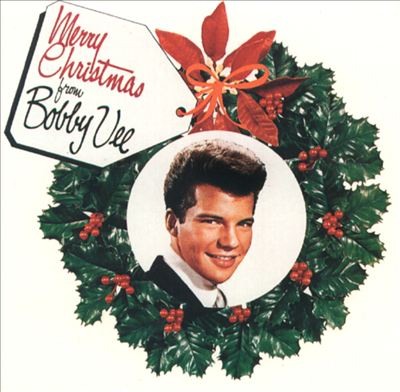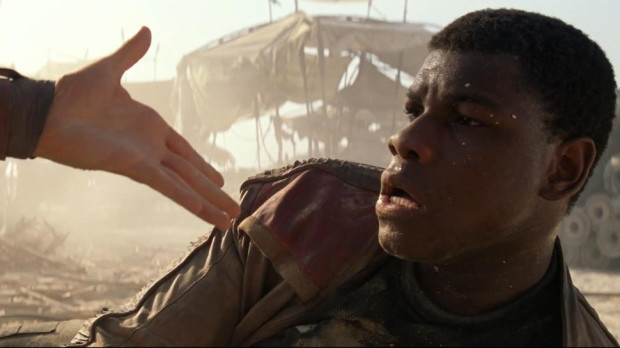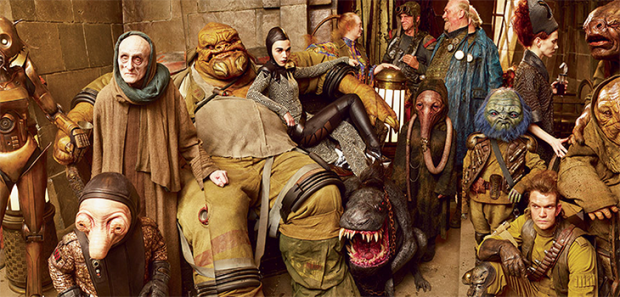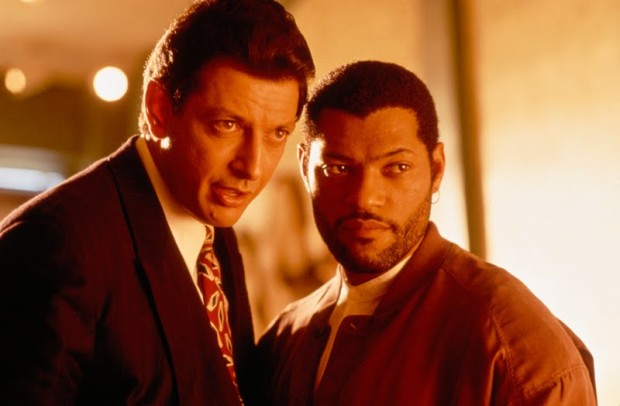So yesterday, a Scriptshadow reader sent me this video of a roller coaster. Why he sent it to me, I’m still not sure. He’s kind of weird. But I’m glad he did. Because as I watched the video, I realized it contained the perfect screenplay lesson.
You see, there’s a reason that rollercoasters don’t start the ride at the top of the track. By making you start at the bottom and go up that hill, that endless clickity-clack-clack-clack hill, they are creating something called anticipation. With each inch closer you get to the top, the more terrified of what’s about to happen you become.
MAJOR FORCE AWAKENS SPOILERS BELOW
Anticipation is a powerful storytelling tool. And it basically works like this. Imply that something big and important is about to happen, then instead of throwing your character into it, make them go up that hill. A perfect example is the death of Han Solo in The Force Awakens. Han Solo doesn’t run into Kylo Ren willy-nilly and boom-bam kill-em dead. Abrams and Kasdan have Han walk across that endless bridge before getting to Kylo. And then they give us a long dialogue exchange before Kylo finally kills him. The scene is pure anticipation.
What you eventually learn after screenwriting for awhile is that it’s never the actual event that impacts you. It’s the anticipation of that event. And so I give this gift to you to play with. Find some time after opening presents to write ONE SCENE that’s centered around anticipation. Feel free to trade scenes with each other in the comments.
Have a wonderful holiday. And try not to get too drunk. Ya freakin alcoholics.
So the hot topic in screenwriting at the moment is that The Force Awakens sucks because its main character (Rey) is a “Mary Sue.” I don’t know if Max Landis is the one who started this argument or he’s just the most prominent person to weigh in on it, but his involvement has brought more attention to the “problem” either way.
Basically, a “Mary Sue” is a female character who is great at everything and experiences no resistance in her journey. Rey can easily use the force. Rey can easily fly a ship. Rey can easily fight a lightsaber battle. The big issue here is that nothing is “earned.”
The roots of this go back to fan fiction, where [mainly] female writers would write themselves into Harry Potter or Twilight storylines and, as a form of wish-fulfillment (along with being bad storytellers) made their characters amazing at everything. Cause, you know, it’s funner that way!
I will say that I never thought about this while watching The Force Awakens. Nor had I ever heard of this term before yesterday. So is this a legitimate concern? Or is it yet another thing the internet masses had to make up as a “legitimate” excuse to hate something?
It’s funny, I look back to one of my favorite scripts, The Equalizer, and you could argue that that protagonist was a “Gary Sue.” He was great at everything. He encountered no resistance. So apparently this isn’t something that bothers me that much.
What may have happened here is that JJ Abrams had such a mandate to write a kick-ass female character, that maybe he went overboard? He made her too kick-ass? Or is there nothing to see here? Internet trolls determined to take something down that’s universally beloved? What’s your take?
I loved The Force Awakens.
Review over.
Bye.
YODA SAYS: “SPOILERS THERE ARE, BELOW.”
No, I’m kidding. To be honest, I expected to be critical of this latest installment of wars that happen in stars. The Hollywood moviemaking system can easily be described as the Hollywood capture-lightning-in-a-bottle system, as that’s essentially what you’re trying to do. Make 300-400 variables all come together and work in your favor over a 1-2 year period. So when Star Wars was not only able to achieve this once, but TWICE (with Empire), it was pretty much guaranteed that the franchise would never accomplish that feat again.
And it didn’t. Jedi was good. But it wasn’t great. And the prequels. Oh… the prequels. You could say that those movies were the universe’s way of balancing shit back out. “You made the best movies in history? Well, we can’t keep allowing THAT to happen. We must restore balance.” And so we got the three worst films in history.
This leads us to The Force Awakens. Am I saying JJ Abrams contacted the spirit of Ben Franklin and somehow managed to bottle lightning one more time? I’ve broken down so many movies and so many scripts at this point, I’m beyond the ability to judge a film purely on the kind of emotional impact required to answer that question. But you know what? The Force Awakens came squiddly-diddly close.
Before I get into the bantha meat of my review, let me reiterate that a screenplay is the sum of its parts. For those of you curmudgeons who will bring back a point I made in Scriptshadow Article #317.b about if there’s a thin character in your script, it means you need to fix it immediately, and that The Force Awakens’ Captain Phasma is a thin character and therefore I must denounce all that is Star Wars past, present, and future and count Force Awakens as one of the worst movies ever because “Youuuuu saaiiid Carson…” I’m not going to do that.
Screenplays are the sum of their parts. Therefore, if you like the majority of those parts, even if the rest of the parts are subpar, guess what? It’s okay to still like that movie. Cause the truth is, there is no perfect screenplay. You can take the original Star Wars to task if you want to. The hero is introduced too late! Oh no. I guess Star Wars sucks now.
Nope. Not how screenplays work.
I’ll tell you how they do work though, and a large majority of it comes back to your main character. If you can nail the main character, nearly every other mistake you make in your screenplay can be overlooked. Because if we love the main character, we’ll want to go anywhere with them. And I loved Rey. This is where JJ really brought the heavy metal. He knew that if he could give us the perfect hero, he could make other mistakes and we’d look past them. So how did he pull this love affair with Rey off? He went old school Scriptshadow, that’s how! Let’s take a look atneverything he did with Rey…
1) Underdog – Rey is an underdog character. She’s a nobody. She’s barely surviving. Everyone looks past her. Audiences FUCKING LOVE UNDERDOGS! When are you all going to learn??? It’s instant likability sauce drip drip dripping on your hero.
2) Deserted by parents – We will always sympathize with someone who’s been left by someone they loved. Rey was fucking ABANDONED BY HER OWN PARENTS. Jesus Christ do we want to see this girl find happiness now.
3) She pushes on despite her misfortunes – Ever meet someone where life has beat them down and they throw up their arms and say, “Well, fuck it. Might as well do drugs and play video games all day?” Not exactly the kind of person you want to root for, right? On the flipside, we LOVE characters who’ve been dealt a terrible hand and yet they KEEP. ON. FIGHTING. This is one of our favorite types of characters and the key to us loving Rey.
4) She’s active – We LOVE active characters. Characters who are out there doing things. Rey spends all day every day scrapping. How can you not admire this?
5) Puts others’ safety/happiness in front of her own. – A droid is about to get kidnapped for parts? Rey is right there to stop it! Girl is being selfless for the well-being of something that’s not even human!
6) Is taken advantage of – We LOVE characters who are taken advantage of because we don’t like it when people are unfairly wronged. We root for the person wronged to rise up and make it right. The scraps dealer Rey sells to every day JUST TO EAT is constantly giving her less and less money for the parts she spends all day scrapping. After every one of these scenes, we root for Rey even more.
Anybody who claims JJ Abrams is a bad screenwriter (and I’ve seen a few dare to do so) don’t realize that this is what he brings to the table. He makes sure his main character is great so that we will care what happens to them. And since in most cases, the main character IS the movie, he knows that if you like his main character you’ll like his movie. This guy doesn’t just depend on mystery boxes, as some internet trolls will have you believe. He’s a well-rounded screenwriter who’s been selling scripts since he was 23 years old. The boy has skills.
Once you have your hero, your ying, you have to create your villain, your yang. And holy shit did I love JJ’s yang. Err, I mean Kylo Ren. Was he as brilliantly conceived as Rey? No. But here’s what Kylo Ren was. HE WAS INTERSTING. As co-writer Lawrence Kasdan put it, there’s no other character like him in the Star Wars universe. And I agree. Villains are probably the hardest characters to write because if you go over the top, they come off as on-the-nose. But if you’re too subtle, they’re not scary enough. You have to strike that balance, and that’s never easy.
What I loved about Kylo most was how UNPREDICTABLE he was. This is an underrated trait of villains that screenwriters should take more advantage of. The guy could go ape-shit in a heartbeat, but he’s also involved in two of the quietest moments in the film. He practically whispers when he takes off his mask needing information from the captured Rey, and also when he’s out talking to Han on the bridge (which might be my favorite scene in the movie). To me, the scariest people are the people for whom you don’t know what’s coming next. Is it compassion, is it rage, is it introspection, anger, curiosity, fear. Kylo Ren displays all of these things, which is why I loved him so much. I mean compare that to say, Darth Maul, who conveyed what? Anger? I think that’s it, right? Actually, looking back on it, I don’t think he conveyed any emotion outside of snarling. Is snaring an emotion?
Next we have the plot itself. One of the complaints coming out of the reviews is that the story moved “too fast.” This actually made me laugh. A story that moves too fast? Oh no! How awful! Let’s see. How many times in history have you complained that a movie moved too fast? Once? Maybe twice? The notoriously common reaction to a movie is that it MOVES TOO SLOW. That’s because it’s really fucking hard to keep things moving in a movie. For Abrams to not have this problem? It’s kind of a miracle.
But it also goes back to the fact that this guy is a great screenwriter and a great storyteller. Keeping a plot moving, as you know from this site, is really hard. But you do it in a few ways. You make sure your lead characters always have goals. You make sure your SECONDARY CHARACTERS always have goals. So if your main characters hit a slower section, we’re still wondering, “Oh shit, well what is Han up to now? He still has to achieve [x]!” You make sure your VILLAIN is always driven by goals. This way, everybody we cut to HAS SOMETHING TO DO RIGHT NOW.
Bad screenwriters either don’t always include goals, or when their characters complete a goal, they don’t replace it with a new one. Certain goals don’t have high stakes, so we don’t care whether they’re completed or not. There may not be any urgency attached to the goal, so it’s not imperative that the goal get taken care of right away, which results in a slowing down of the plot. A good screenwriter is always checking in on all the characters at all times and making sure they have something to do. And that’s the reason this screenplay moves so fast, is because JJ and Kasdan made this a priority.
Would I have liked a little more time with Rey at the beginning? Of course. I think that would’ve made me like her even more (if that’s possible). You can even see in the trailers that a lot was cut from her planet. We get shots (her scrapping) and lines (“Who are you?” “I’m no one.”) that JJ decided to snip to keep the pace going. The thing is, this is every writer and director’s biggest fear – is their story moving too slow. So they’re always cutting, always only including what’s needed and nothing more. JJ might’ve been the first director in ten years who cut 10% more than he needed to. His movie was so good, it could’ve survived an added ten minutes.
Before my praise-lavishing comes to an end, I’m going to explain to you why JJ Abrams now understands Star Wars better than the man who created it. One of the only praises people had for The Phantom Menace was the lightsaber battles, particularly Obi-Wan and Qui-Gon vs. Darth Maul. But you know what those people were really saying? “This movie is so bad, that I need to hang my hat on something, anything, so that I can’t call this Star Wars movie a failure.” And boy were those lightsaber battles a doozy. Right? Right?
Indeed, they were fun to look at if you’re a fight choreography dork who melts at the mention of Iko Uwais and spends 364 days a year prepping for Choreo-Con. But if you were looking for emotion? For meaning in those fights? You found nothing. You found nothing because who the fuck was Darth Maul? As I pointed out above, he had no emotional component whatsoever. He was a snarl. And who was Qui-Gon? A nice Jedi? That’s the emotional complexity George Lucas had devolved to? Nice vs. Snarl? And don’t get me started on the borrible Obi-Wan. The point is that no matter how many flips they did or times they cut each other in half, it left us with no feeling whatsoever.
I’m going to say something pretty controversial here. The lightsaber battles in The Force Awakens… they kinda sucked. Kylo Ren just kept doing the same clumsy overhead strike again and again. Rey had some kinda cool moves. But overall, the lightsaber battles were weak. And you know what? It was still ONE FUCKING THOUSAND TIMES BETTER than that Qui-Gon Obi-Wan Darth Maul battle. Because Kylo was in one of his complex rages. And Rey was struggling with this newfound ability. But most importantly, I LIKED REY and I WAS FASCINATED BY KYLO. Each character was acdtually compelling. And interesting. And had something on the line other than hitting their marks. That meant I ACTUALLY CARED WHAT HAPPENED BETWEEN THEM. They could’ve thumb-wrestled and I still would’ve been riveted. And if there’s a lesson to lesson here, it would be that. Focus on the people, not the fights. You do that and the fights will take care of themselves.
Okay, now that I’m finished regurgitating the awesomeness I gorged on, it’s time to point out some of the film’s faults, although I’ll contend these issues were at least partly due to big bad Disney. To come up with something truly original, you need time and LOTS OF DRAFTS. You need to write through the obvious to get to the unobvious. And Disney didn’t give JJ any time. So yeah, I’m still defending JJ.
The first gripe is that, yes, the plot feels similar to the original Star Wars. Lone person on desert planet, droids with important plans, giant battle stations. Here’s the thing though. It didn’t feel SO similar that it ruined my enjoyment of the film. The things that anchored the story (a female protag, a storm trooper gone rogue, a search for Skywalker) were different enough that while I felt the parallels to A New Hope, I never felt like it was a beat for beat copy.
But here’s where I did have a problem. The one thing Lucas brings to the table that JJ doesn’t is imagination. JJ basically used pieces that were already there. Lucas CREATED ALL THOSE PIECES. I read an interview with Lucas a long time ago and in it he was asked how he came up with Jabba the Hut or some other weird character. And he said, “Honestly, some of this stuff is just whimsy. I like the thought of it.”
And JJ’s not like that. He’s a storyteller and when you tell a lot of stories, it gets drilled into your head that everything needs to make sense. Everything needs to be logical. The reason Star Wars is what it is is because it isn’t always logical. It doesn’t make logical sense to have a giant slug who couldn’t escape a determined alien amputee be the most feared gangster in the galaxy.
And the thing that made Lucas Lucas is that he didn’t care. He just liked the idea of a giant slug gangster. JJ doesn’t have that talent. He’s scared to go into the depths of his imagination and come up with something truly weird because those are the things that are the least easy to calculate. JJ knows that having someone take advantage of Rey early on will result in a calculable emotional reaction from the audience. But he doesn’t know what will happen if he makes Finn a no-headed Quaseldorf from the planet Yim-Yam. So he makes him a stormtrooper instead.
Speaking of Finn, he didn’t work AT ALL. And it didn’t help that John Boyega’s acting amounted to, “Holy shit, I’m in Star Wars! Holy shit, I’m in Star Wars!” But here’s why Finn doesn’t work. JJ and Kasdan had the right idea. You take a bad guy and you place him inside the gang of good guys. It’s good old fashioned dramatic irony. We know Finn is bad, but nobody else does. Oh no, what’s going to happen!?
Well what happens is that JJ and Kasdan never fully commit to the conceit. Yes, we have someone from the First Order inside the Resistance. BUT WHAT ARE THE STAKES???? If they find out Finn is a stormtrooper, what’s going to happen to him? I’ll tell you what. ABSOLUTELY NOTHING. Not only is Finn fully committed to the Resistance now and therefore not a threat, JJ has so little confidence in the storyline that he actually starts letting everybody know Finn’s secret! BB-8 knows. Han Solo knows (“Sooner or later, women find out the truth.”). If this secret matters at all, how come it’s freely shared and no one seems bothered by it?
I think what happened was that they realized at a certain point, “Uh, this isn’t working. There are no stakes if he’s figured out. What next?” And so they kind of transferred the stakes over to Rey. If Rey found out Finn was part of the First Order, she wouldn’t like him anymore. So ruining a potential romance is now the consequence of Finn’s big secret. Except JJ and Kasdan never make it clear if there is a romance, so again, the stakes aren’t very high.
Yesterday, I highlighted a movie to watch for this specific purpose. In it, Lawrence Fishburne plays a cop who must go undercover into a gang of drug dealers in order to take them down. THAT’S how you do Finn’s storyline right. We knew that if at ANY MINUTE, they figured out Fishburne was a cop, HE WAS DEAD. So there was tension in every moment and the writers could play with that. They could build scenes around the fact that Fishburne’s identity was in jeopardy (make him have to kill someone to prove his loyalty). We never sensed anything close to that with Finn.
It’s a little upsetting that this was the one big deviation in plot from Star Wars and JJ got it wrong. It shows that without that blueprint, he was flying blind. I have no doubt he would’ve figured it out with more drafts but they just didn’t give him the time. Moving forward, Finn is my one big worry for the franchise. He doesn’t seem to fit. He doesn’t seem to have an intriguing arc, unless he’s secretly a jedi, which wouldn’t make sense. This half-realized idea would’ve been best left at the alter, replaced with the incredibly charismatic and underused Poe Dameron. Who knows? Maybe Rian Johnson will figure something out with him.
NERDY DISCUSSION POINTS 3000!
It’s time to throw screenwriting theory out the window and go full nerd. When you go full nerd, you do not need facts. Just a strong opinion and a lot of pent-up self-hatred, and to that end, I will address some nerdy discussion points of Force Awakens.
How can Rey use the force if she’s never trained?
I think it goes back to what I said earlier. If you can make us believe in a character, you can make us believe in anything they do. I liked Rey so much I believed she had a strong sense of the force. But here’s where it gets interesting. A part of me thinks that Luke was channeling the force THROUGH REY. That’s why she seemed half-confused whenever she was using it. The big clue to this is when she’s in the chair and knows to tell the stormtrooper to let her go. That’s a specific callback to Luke watching Obi-Wan say the same thing in the original Star Wars. I think Luke has gotten so powerful – more powerful than any jedi in the history of the galaxy – that he’s learned how to speak and control people throughout the galaxy, specifically those who also have the force and who, in this case, might be his daughter.
Then there’s Snoke. Who is Snoke? Why is he 80 feet tall and has a weird crevice in his head? Snoke is derided in the reviews as one of the weaker additions to the franchise and I’d agree with that. FOR NOW. Because I think there’s more going on here. The shots of him in the cave with the projection seem to be a specific reference to The Wizard of Oz. This might be Snoke’s projection, but it very well might not be anything like who the real Snoke is. The real Snoke could look completely different. I’m guessing even a tiny creature, a callback to Yoda. Might we finally get the true GOOD phantom menace story we were all hoping for? Either way, there’s more to Snoke than meets the eye.
You know what? I realize that if left to my own devices, this review could go on for ages and you know what? I want to go see The Force Awakens again. So I’ll stop here. And just say, yeah, this movie was freaking awesome. Big props to JJ and Kasdan for doing an amazing job, especially in the amount of time they had!
[ ] what the hell did I just read?
[ ] wasn’t for me
[ ] worth the read
[xx] impressive
[ ] genius
What I learned: You should be able to go to any point in your screenplay, look at your relevant characters in that moment, and see that they’re trying to achieve something (a goal) RIGHT NOW. If they’re not trying to achieve anything, rewrite it so they are. Because if too many of your characters are inactive at the same time, your script will drag. That’s when you’ll hear readers say things like, “Nothing seemed to be happening.” The Force Awakens is one of the best examples this decade of a movie where everyone in the story has something to do whenever we cut to them. It’s a great study companion to see how to keep a plot moving.
Deep Cover with Lawrence Fishbone and The Blume!
Sorry no Amateur Offerings yesterday. The rest of the year is going to be hit or miss on posts. Gotta keep you guys on your toes. And, you know, Scriptshadow 250. Today’s movie suggestion actually has a dual purpose. You see, in tomorrow’s Force Awakens review, I’m going to go kamikaze on the character of Finn. And Fishburne’s character here in Deep Cover is what I’ll reference as THE RIGHT WAY to do what JJ and Kasdan messed up with in Awakens. I won’t give anything away more than that. The loose logline for Deep Cover is, “A policeman is recruited by a devious drug enforcement agent to infiltrate a smuggling organization seeking to expand into designer drugs.” This is an awesome movie. If you haven’t seen it already, I hope you enjoy it!
Absolutely LOVED Force Awakens!!!
Kylo Ren best film villain of the past decade. Rey was better than Luke Skywalker in Ep IV. BB-8 somehow made me forget 3PO and R2. Finn was huge disappointment. Like almost as badly conceived as Queen Amidala. That was the only major misstep.
For those saying this was a copy-cat job don’t realize how much JJ and Kasdan actually did here. Was expecting a terrible script based on reviews. This was deft screenwriting here. One major non-spoiler gripe. But you’ll have to wait til Monday for my screenplay-centric review!
In the meantime, feel free to discuss the movie in this thread. Please be considerate and put, in capital letters, “SPOILER” above all spoilers. If you do not include that word, we will consider what you’re saying to be spoiler free.












